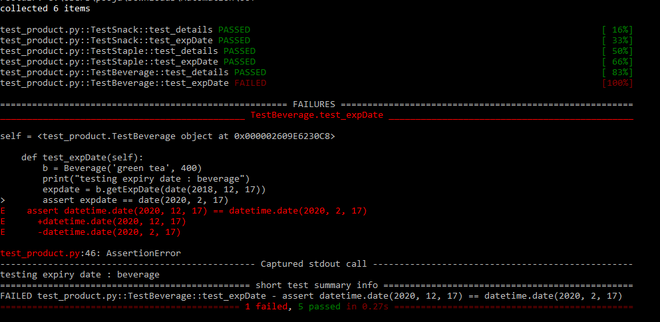Python中的面向对象测试
先决条件:面向对象的测试
可以使用Pytest测试工具在Python中执行自动化的面向对象测试。在本文中,我们通过为类执行测试用例来执行面向对象的测试。我们编写了一个程序,其中有一个名为 Product 的父类和三个子类——Snack、Beverage 和 Staples。我们实现所有类并将它们保存在一个名为product.py的文件中。这些类具有以下功能:
- 小吃——printDetails( )和getExpDate()
- 饮料 – printDetails()和getExpDate()
- 订书钉——printDetails( )和getExpDate()
重要的是要注意getExpDate()在这种情况下是一个被覆盖的函数。
product.py文件中的代码:
Python3
# importing the modules
from datetime import date
from dateutil.relativedelta import relativedelta
# base class
class Product:
name = ""
# printing the class in the constructor
def __init__(self):
print("super class Product")
# getExpDate() returns the expiry date of product
# since every product has different expiry date
# therefore this method is overridden by child classes
def getExpDate():
# gives exp date
print("Expiry date")
pass
# derived class 1
class Snack(Product):
# months
shelfLife = 6
price = 0
# constructor - initializing variables
def __init__(self, name, price):
self.name = name
self.price = price
# prints the Snack product details
def printDetails(self):
print("name : " + self.name)
print("price : " + str(self.price))
print("shelf life : " + str(self.shelfLife) + " months")
# calculates the expiry date using relativedelta library and returns
def getExpDate(self, pkdDate):
expDate = pkdDate + relativedelta(months=self.shelfLife)
return expDate
# derived class 2
class Beverage(Product):
# 2 years
shelfLife = 2
price = 0
# constructor - initializing variables
def __init__(self, name, price):
self.name = name
self.price = price
# prints the Beverage product details
def printDetails(self):
print("name : " + self.name)
print("price : " + str(self.price))
print("shelf life : " + str(self.shelfLife) + " years")
# calculates the expiry date using relativedelta
# library and returns
def getExpDate(self, pkdDate):
expDate = pkdDate + relativedelta(years=self.shelfLife)
return expDate
# derived class 3
class Staples(Product):
# 1 year
shelfLife = 1
price = 0
# constructor - initializing variables
def __init__(self, name, price):
self.name = name
self.price = price
# prints the Staples product details
def printDetails(self):
print("name : " + self.name)
print("price : " + str(self.price))
print("shelf life : " + str(self.shelfLife) + " year")
# calculates the expiry date using relativedelta
# library and returns
def getExpDate(self, pkdDate):
expDate = pkdDate + relativedelta(years=self.shelfLife)
return expDate
def main():
s = Snack('cookies', 60)
s.printDetails()
print(s.name + " will expire on " +
str(s.getExpDate(date(2019, 10, 3))) + "months")
# yyyy-mm-dd
p = Product()
st = Staples('rice', 300)
st.printDetails()
print(st.name + " will expire on " + str(st.getExpDate(date(2020, 1, 23))))
b = Beverage('coffee', 250)
b.printDetails()
print(b.name + " will expire on " + str(b.getExpDate(date(2018, 12, 17))))
print("done till here")
if __name__ == '__main__':
main()Python3
# importing the modules
import pytest
from product import Snack, Staples, Beverage
from datetime import date
class TestSnack:
# test case for print details of Snack
def test_details(self):
s = Snack('chips' , 50)
print("testing details : snack")
assert ('chips' , 50, 6) == (s.name, s.price, s.shelfLife)
# test case for calculating exiry date of Snack
def test_expDate(self):
s = Snack('wafers', 40)
print("testing expiry date : snack")
expdate = s.getExpDate(date(2019, 10, 3))
assert expdate == date(2020, 4, 3)
class TestStaple:
# test case for print details of Staples
def test_details(self):
st = Staples('rice' , 300)
print("testing details : staples")
assert ('rice' , 300, 1) == (st.name, st.price, st.shelfLife)
# test case for calculating exiry date of Staples
def test_expDate(self):
st = Staples('wheat flour', 400)
print("testing expiry date : staples")
expdate = st.getExpDate(date(2020, 1, 23))
assert expdate == date(2021, 1, 23)
class TestBeverage:
# test case for print details of Beverage
def test_details(self):
b = Beverage('coffee' , 250)
print("testing details : beverage")
assert ('coffee' , 250, 2) == (b.name, b.price, b.shelfLife)
# test case for calculating exiry date of Beverage
def test_expDate(self):
b = Beverage('green tea', 400)
print("testing expiry date : beverage")
expdate = b.getExpDate(date(2018, 12, 17))
assert expdate == date(2020, 12, 17)输出:
name : cookies
price : 60
shelf life : 6 months
cookies will expire on 2020-04-03months
super class Product
name : rice
price : 300
shelf life : 1 year
rice will expire on 2021-01-23
name : coffee
price : 250
shelf life : 2 years
coffee will expire on 2020-12-17
done till here
为了执行面向对象的测试,我们为每个类编写测试用例。在编写这些测试用例时,应牢记以下几点:
- 创建一个单独的测试类来测试每个类的功能,例如TestSnack , TestStaple , TestBeverage
- 为类的每个函数编写一个测试用例
- 使用assert关键字在测试用例中添加断言。如果测试用例通过,assert 语句将返回True ,如果测试用例失败则返回False
我们为product.py文件的所有类中存在的每个函数编写了测试用例,除了 Product 类(父类)。这是因为 Product 类只有一个函数,而且它也被子类覆盖了,所以编写测试用例没有任何区别。因此,我们总共编写了 6 个测试用例,其中为每个子类编写了两个测试用例。
test_product.py文件中的代码:
蟒蛇3
# importing the modules
import pytest
from product import Snack, Staples, Beverage
from datetime import date
class TestSnack:
# test case for print details of Snack
def test_details(self):
s = Snack('chips' , 50)
print("testing details : snack")
assert ('chips' , 50, 6) == (s.name, s.price, s.shelfLife)
# test case for calculating exiry date of Snack
def test_expDate(self):
s = Snack('wafers', 40)
print("testing expiry date : snack")
expdate = s.getExpDate(date(2019, 10, 3))
assert expdate == date(2020, 4, 3)
class TestStaple:
# test case for print details of Staples
def test_details(self):
st = Staples('rice' , 300)
print("testing details : staples")
assert ('rice' , 300, 1) == (st.name, st.price, st.shelfLife)
# test case for calculating exiry date of Staples
def test_expDate(self):
st = Staples('wheat flour', 400)
print("testing expiry date : staples")
expdate = st.getExpDate(date(2020, 1, 23))
assert expdate == date(2021, 1, 23)
class TestBeverage:
# test case for print details of Beverage
def test_details(self):
b = Beverage('coffee' , 250)
print("testing details : beverage")
assert ('coffee' , 250, 2) == (b.name, b.price, b.shelfLife)
# test case for calculating exiry date of Beverage
def test_expDate(self):
b = Beverage('green tea', 400)
print("testing expiry date : beverage")
expdate = b.getExpDate(date(2018, 12, 17))
assert expdate == date(2020, 12, 17)
注意:函数名和测试文件名应始终以单词“ test ”开头。
要执行上述测试用例,请在单个文件夹中创建两个单独的文件product.py和test_product.py 。要执行写入以下命令:
pytest
或者
pytest -v
pytest -v显示详细输出。
输出如下所示:

如果我们更改测试用例的断言语句之一中的值,则会导致测试用例失败。请参阅下图所示的输出:

在上面显示的输出中,TestBeverage 类中的test_expDate ()测试用例失败,因为断言语句导致False表达式。